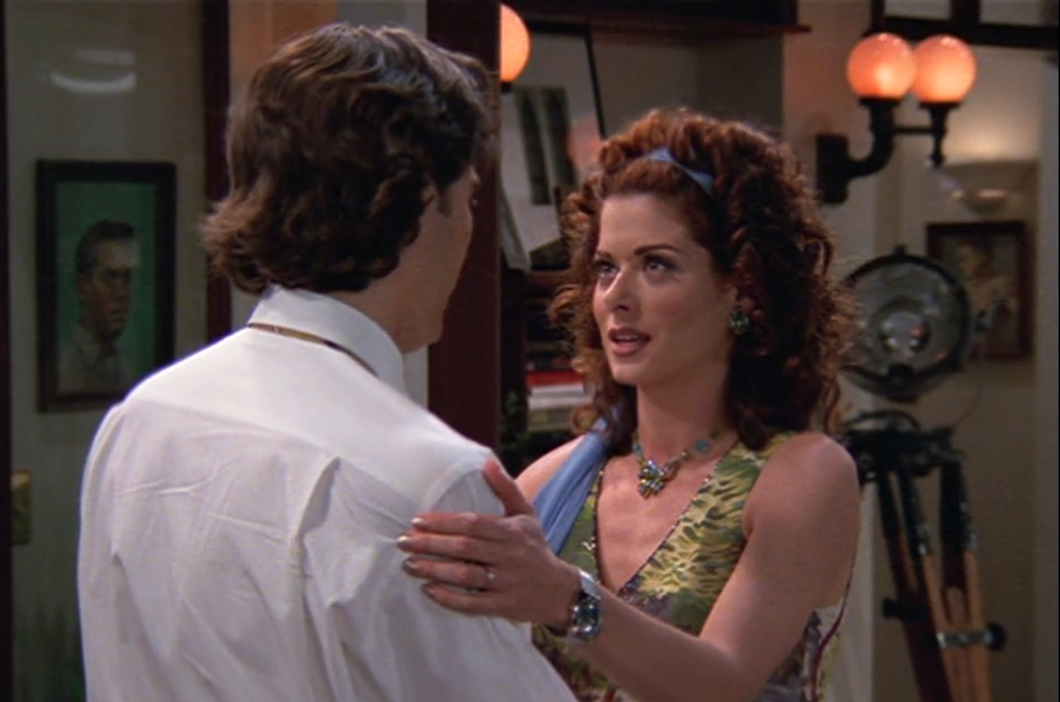*WARNING: THERE ARE GOING TO BE SOME SPOILERS*
Pride Month is one of my favorite times of year. It makes me so happy to see people embracing who they are, sometimes making public declarations of their identities with, well, pride, and celebrating uniqueness with those who love, support, and identify with the same identities. That being said, every month might as well be pride month watching Will and Grace, and I'm focusing on the original series because I am not watching the new series until I've rewatched and refreshed on the entire original one (available on Hulu and YouTubeTV in case you are interested).
Jack McFarlene is the stereotypical gay man, but not JUST the stereotype
Episode after episode, we see Jack burst into scenes with enthusiasm, often times with a song and dance, possibly with a Cher impression. Characters make fun of his "sissy" attitude, and Jack is probably the most secure in his sexuality. That being said, we see Jack struggle to get along with Will and his friends when they go to work out at the gym (along with some major "in the closet" behavior from Will) and we see that Jack has not come out to his mother until most of the way through the first season. He flaunts his sexuality, but we get to see more of him than just being a gay man used for comic relief.
Will Truman is powerful and his sexuality is an accessory oftentimes instead of his main attribute.

In the first episode, we see Will at the law firm he started, and his main client not only knows he is gay, but doesn't care, despite the fact that being gay was still considered socially wrong by a lot of people. In the episodes we come, we see that Will has a lot of social interactions where his sexuality does not come up, and though I love Jack as a character, Will represents a different type of gay man that isn't as obvious and flambuoyant, which is important. the sitcom won tons of Emmy awards and is credited as helping to improve public opinions of the LGBT community.
Grace Adler has a "gay best friend" in Will, but they aren't just always talking about clothes and boys.

Will and Grace have a typical best friend relationship where they live together and spend lots of time with each other. Unlike a lot of LGBT shows and movies, especially those I watched when I was a bit younger, Will and Grace argue about things like a married couple, bills and important, adult things, instead of petty things like clothes and who would make a good date (though there is a lot of that, too). The "gay best friend" aspect has a level of maturity, instead of being all about shopping and getting manicures.
It's especially nice to see Will and Grace get confused for a married couple because it means that Will isn't following all the stereotypes.
This show deals with some major social issues.

Where to begin? Jack marries Karen's maid to keep her from being deported. Grace dates multiple men and it isn't a "hiding" thing (and before it was acceptable to have open relationships and throuples). I think my favorite issue to come up was Will and Jack protesting NBC (the same network Will and Grace is on) for not allowing a gay kiss on TV during primetime. Jack and Will end up kissing (as we see by the GIF), and it didn't stop the show from continuing, unlike a lot of other shows that came around the same time (ex: Ellen Dengeneres' sitcom going off the air one season later with the "mature content" warning before every episode following her character coming out).
We've come a long way since 1998.

I know I've been spending this whole article tellng you how amazing Will and Grace is, but there are a few limitations. I've noticed as I rewatch the show that there isn't nearly as much time devoted to Will's realtionships in a genuine light as there is with Grace. We can see Grace in bed with her boyfriends. We can hear her talk about her sex life. We don't get to hear a lot about Will. A lot of the series is devoted to Will solving Grace's problems. Now, there are a bit more focuses on gay relationships and it isn't taboo to see two men in bed.
Returning to Jack and his stereotypes, we can see those types of characters, but we also get to see a lot more normalcy in every representation of gay man.
When trans women appear on the show, they're treated like the outcasts and as a joke. Now, audiences are more willing to embrace men and women at all stages of transition (and the lack of transition, for people who identify and choose not to transition to pass completely with their chosen gender).
The more feminine gay man is treated as one of the many representations of a gay man, and the punchlines of jokes are not always about gay men and women being one in the same. As well, we don't have to see that gay men look at lesbian women as men (as we see Jack do when a lesbian couple comes to be in the same play as Jack and WIll on gay sensitivity within police departments- he sings a lumberjack song and calls them fellas).
Hook-up culture is not so much a staple of the gay identity.
"Fairy" and "queer" are 1) not the main vocabularly when referring to people and 2) are not insults (as Jack and Will yell at each other all the time).
The sitcom did a lot for the community, and the newer version is doing even more. But it is interesting to see how far we've come.
























